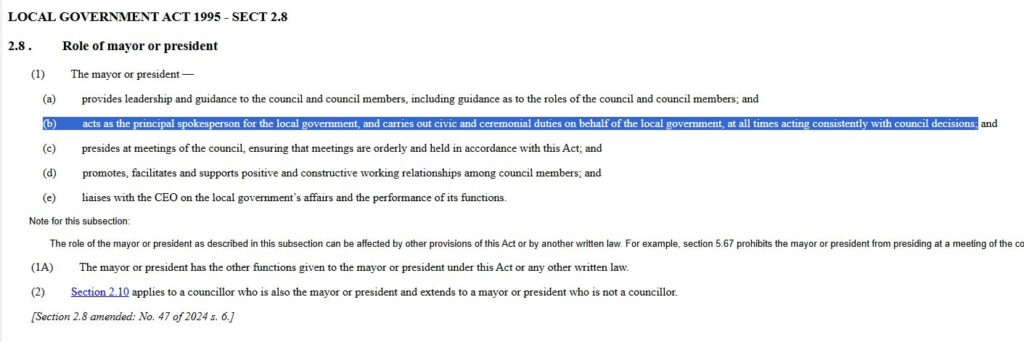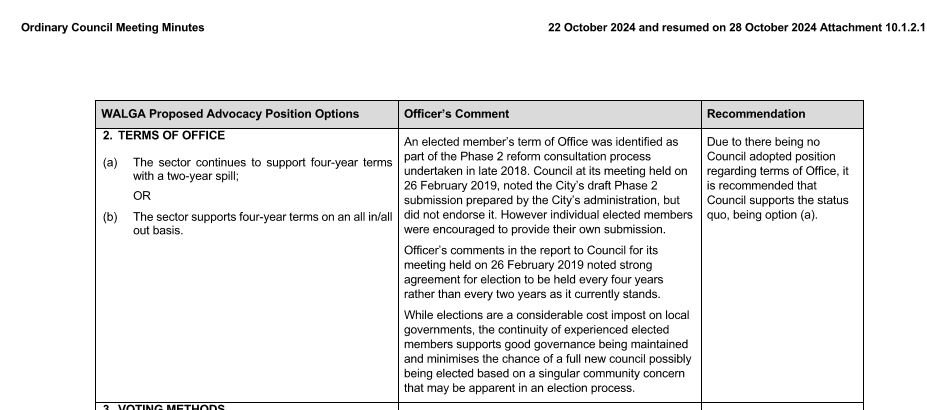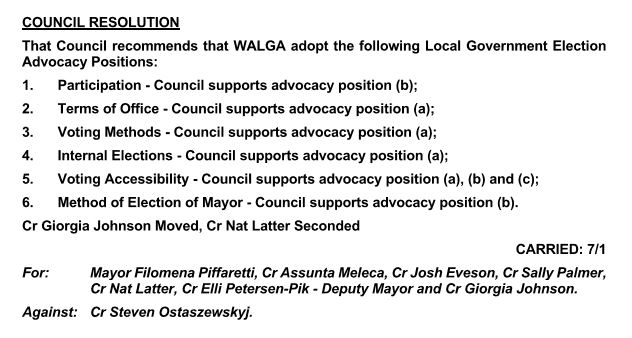
There is a serious failure of governance when the line between the role of council and the role of administration is breached.
One of the core foundations of governance is the separation between the board and the executive. In companies you can have executive directors where a key executive such as the CEO also sits on the board where they have a voice, and a vote. In local government there is no scope for this; the only people who can vote are those who have been elected by a ratepayer or resident. And the only people who can run the operations of the local government are the paid staff.
For local government, the council must not direct the administration on how to fulfil their job. And the administration must defer to council’s positions – whether they like them or not.
I raise this because at WALGA’s 21 August 2025 East Metropolitan Zone meeting (item 8.2), the City of Bayswater put forth an eight page proposal that WALGA advocate for all Councillors to be elected every four years, rather than the current staggered two year cycle.
The merits of this are irrelevant to this blog on governance, but how it came to be is everything.
It is clear that it is a City of Bayswater proposal because it says so:

It is highly likely that Mayor Filomena Piffaretti voted for it, because she moved it:

(WALGA should really improve their own governance by detailing the names of people who voted For and Against)
Now one of the roles of a Mayor is “acts as the principal spokesperson for the local government, and carries out civic and ceremonial duties on behalf of the local government, at all times acting consistently with council decisions”

It is arguably acceptable for someone the Council has appointed to an external board/committee to vote in a manner which is contrary to a Council position because the representative’s duty now lies with that external board/committee during meetings. But I consider it is wholly inappropriate for someone at the City of Bayswater to get staff to research and write an 8 page proposal seeking to influence WALGA, unless that position is aligned with the Council’s position.
And the City of Bayswater council does have a stated position on this. In October 2024, the Council voted to recommend to WALGA that “the sector continues to support four-year terms with a two-year split”:


So who in the City of Bayswater is working against the Council’s position?
I can only see two options. The first is that the Mayor directed the staff to prepare the report and start advocating for this position – which she has no authority to do (neither in directing the staff to write a report, or to act against the Council’s position in this way).
Or the City of Bayswater’s CEO has decided that he is responsible for setting policy on a State wide basis, and has morphed into what is known as an “activist CEO”.
Either scenario is not acceptable, and both are as concerning as each other. It well and truly crosses the lines between administration and council. It is of such seriousness that the WALGA representatives need to ask WALGA how that City of Bayswater motion came to be included in the WALGA agenda, and the City of Bayswater Council needs to work out who at the City of Bayswater is behind the report. Who requested it, who wrote it and who dictated the slant that was taken in it? And, most importantly, why was a strategic position taken which is contrary to the Council’s strategic position?
If I was still on council, depending on the answers, I would likely be considering moving a confidential council motion to either have Council issue an official warning to the CEO, and/or have Council collectively refer the Mayor to the Standards Panel.